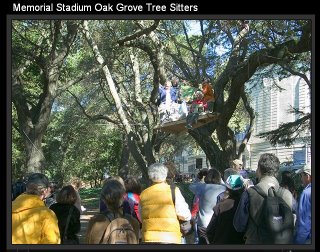
Well Folks,
Again I "volunteered" to do an event on behalf of Sierra Club and it's running now and looks like it's not a total failure. So I may as well tell the 5 blog readers about it. The event is called "Sierra Club / Sustainable Peralta Film Festival" and it's basically a chance to show a bunch of environmental themed movies from a list provided to us by
Sierra Club national productions. (click the link to the page from national club and you can see all the movies I had to choose from). As the lead Club organizer for this event, it was my job to pick from all the available movies, the ones that I thought would go over best in Oakland. Take a look at our
program and you will see which ones I chose. I did this after viewing at least twice as many movies at home on my own. The ones we aren't showing I excluded mainly because they are too, well, "white". How does one say this. Most of the movies tend to focus on issues that are rather academic / scientific and don't highlight the theme of environmental justice very well. For instance, if
sea level rises 1-3 feet by 2100, as some scientists predict, which neighborhoods do you think will be affected first?* The lowlands. In Oakland, this means the neighborhoods in West Oakland surrounding the Port. These are traditionally not "white" (though it is changing even in these neighborhoods due to "gentrification" and the escalation of property value)
So what I'm saying is it's not a black-and-white issue. However, if you see most of these movies, you might not get that impression. So, we / I selected movies that highlighted social justice / environmental justice themes.
The movie THIS BLACK SOIL, which we showed Tuesday, was in fact a "stretch" in terms of being environmental, because it was really about how a very poor (black) community out east was able to organize itself (with help from outside), resist a planned prison construction and later got help from the government. But still it was a good message. In the end they showed the community getting their hands dirty working some farm fields, and so that at least made something of a connection from the people to the land vs. people to prisons. Tonight we showed POWER OF THE COMMUNITY, which was about Cuba. Attendance was about double what it was Tuesday (70+ people compared to about 35 on Tues.) This movie was probably a little more entertaining. Or maybe showing free movies on a Tuesday is just hard? After all the publicity work we did I kind of hoped more people would come. But still it's good at least that many people did come and hear our message.
I was a little nervous tonight. But since I didn't have to do much at the mike except fill in some dead space in between the movies, and act as moderator for our featured speakers, it was not too bad. My friend did remark that I used the "evil umm" a lot. Maybe Dead Crow in Georgia can give us tips how to avoid the dreaded "umm" and such filler words?
p.s. Crow, I have learned (by doing a public service announcement at KPFA) the 7 "banned" dirty words on the radio. Do you have them memorized? :-)
***
* from http://en.wikipedia.org/wiki/Sea_level_rise : If all glaciers and ice caps melt, the projected rise in sea level will be around 0.5 m. If the melting includes the Greenland and Antarctic ice sheets (both of which contain ice above sea level), then the rise is a more drastic 68.8 m.[3] The collapse of the grounded interior reservoir of the West Antarctic ice sheet would raise sea level by 5-6 m.[4]


